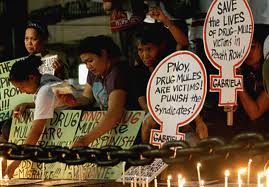Three Drug Mules.
Filipino Drug Mules executed in China

I've been following this story pretty religiously since Binay's visit to Beijing because it puts me in such an ambiguous position.
Just to give a summary -- In 2008, three Filipinos were arrested in China for carrying packages of heroin. Smuggling any amount above 50 grams is punishable by death in China. They were muling at least 4 kilograms each. They were executed last Wednesday, 30 March, by means of lethal injection.
If we were to look at this flatly, there's an existing law. It's a very specific law. By having that law, China reserves the right to enforce the said law not only on its citizens, but on the foreigners it hosts within her jurisdiction. That aside, we're talking about illegal drugs and by agreeing to be an accessory to smuggling, one accepts the consequences. And no, stupidity is not an excuse.
In a black and white world, the turn of events are following logical political patterns.
BUT... I'm straddling the fence a lot when it comes to this. I'm so dim witted when it comes to all this socio-political issues that I'm not even going to argue a side. Instead, I'm just going to share some insights I've had about the whole thing from both sides of the fence so yes, they WILL be contradicting for the most part:
1. Despite following the logic I mentioned earlier, I find any death penalty law to be out of place. There's just something off about being able to dictate and enforce that SOMEONE WILL DIE... unless, you're the killer. So, what makes death penalty different from cold blooded murder? Death penalty has the documents to back up the act of taking someone's life, but in essence they're pretty much the same. That's my opinion anyway and it's just from a moral perspective.
2. Still on death penalty laws: In the 1940s, we had death penalty laws too. One September in the late 40s (1947 or 1949?), there was a case of a Filipino lawyer and his son shot during a drive by. Three suspects were taking into custody late that month. In October of the same year (one month after), the suspects were put to death by means of electric chair.
I guess about 6 decades after, our governing bodies lost their balls for some confused sense of "human rights protection" that sadly, isn't really protecting anybody at the moment.
3. Semi-not-really connected to number 2: I'm pretty impressed with how China carries out and enforces their laws. Not just death penalty laws, but laws in general. I love how they're so straightforward and direct. I guess this is just speculation, but I think not making exceptions for a rule is not really a part of their culture.
4. Semi-not-really connected to the last sentence of number 3: The Philippines on the other hand is culturally opposite. If China isn't really making exceptions, Filipinos tend to have the "Paki-usap" culture. We always want exception. We like to copy our "idol" nation
I'm going to stop following this story today because it takes up a lot of my time. On a final note, I just want to say that what we do now, as individuals or as a community, will not bring these three people back to life -- whether it be pressing for China to abolish the death penalty, pointing the blame to international syndicates and presenting ourselves as victims or any other form of human right protests.
We all need to accept the sick sad reality that three of our compatriots have been put to death, but we shouldn't allow them to die in vain. I hope we can all make it monumental and inspiring for two things:
1.) We need to stop allow ourselves to be bullied foreign drug syndicates.
2.) We need to create more jobs at the local level so we don't have to resort to "quick bucks" from said drug syndicates
